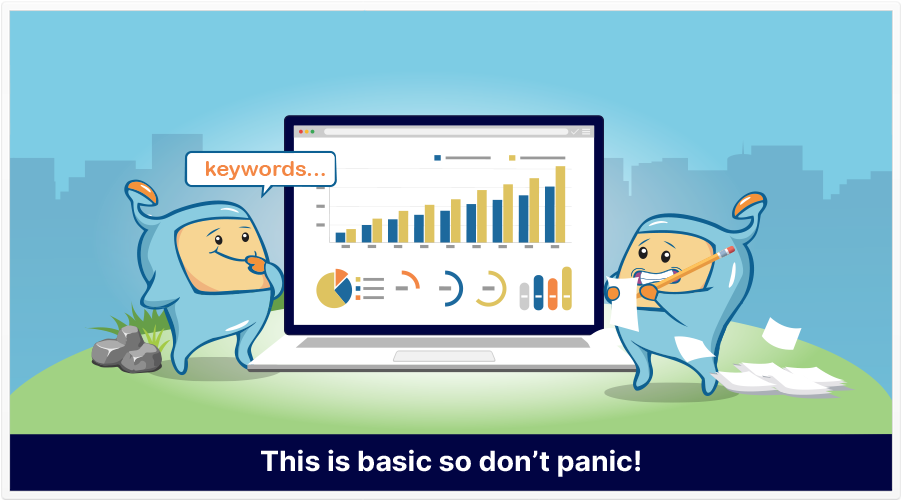
You might be wondering if the “keyword” that you always knew is the “keyword” that we are also going to talk about today?
Yes it is, but how can this keyword help you in your business or help you get potential customers?
If you’re familiar with Search Engine Optimization (SEO), you probably heard the following terms: list of keywords or list of terms, keyword research tools or just keyword tools, keyword ideas, informational keywords, commercial keywords, navigational keywords, the importance of user intent and their buyer personas, the search box, even its level of competition (keyword difficulty) and how can we use all of these in making a content strategy.
In order to create a quality blog post for your target customers, let’s check if you are choosing keywords for SEO that are beneficial to your business.
I know there’s quite a lot of terms I mentioned earlier but first, let me introduce to you what is a “keyword”.
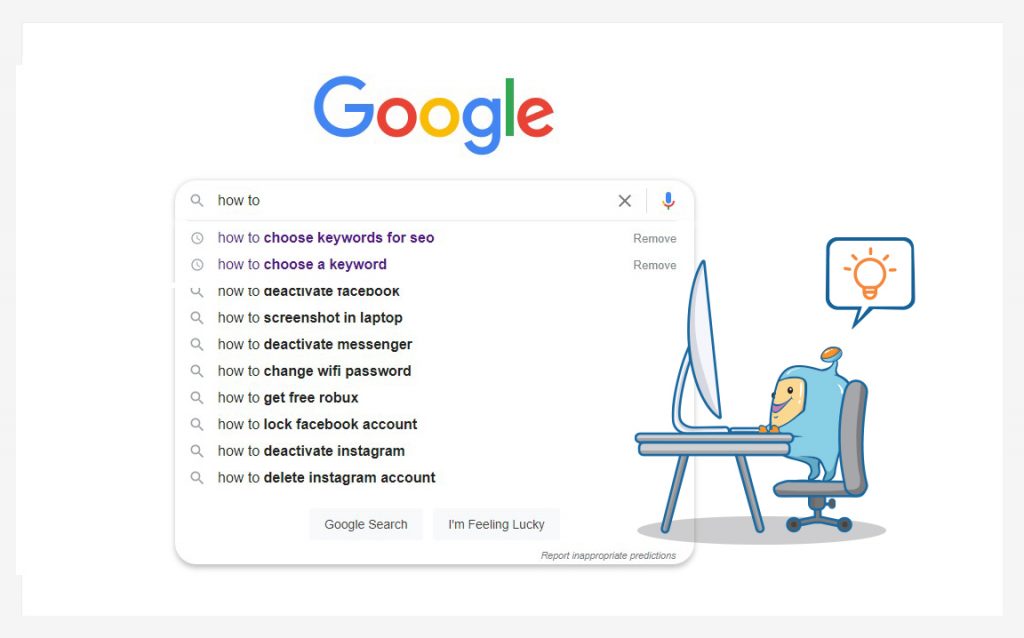
A keyword, often known as a focus keyword or focus keyphrases, is a word that best represents the information on your website or your blog post. It’s the search keyword for which you want a specific page to rank for. People should be able to find that page on your website when they use Google or other search engines to look for that key terms or phrase when searching.
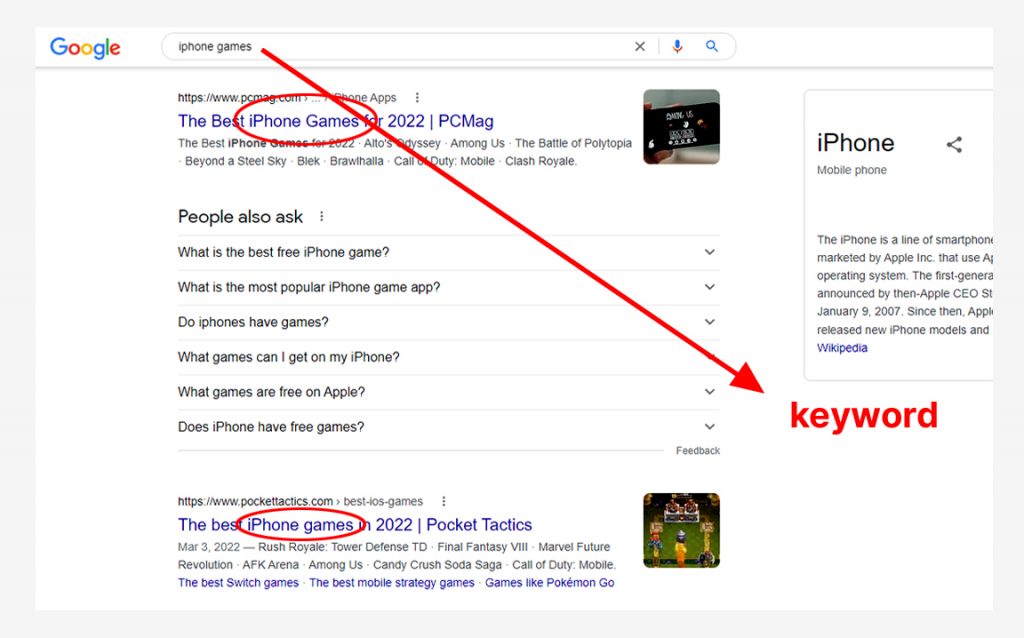
Let’s imagine you have a travel website where you sell different kinds of travel services. You write a blog about the perfect places for vacation, you’ve developed a category for Vacation Tour Package, then consider what type of search term do you wish to appear in? Which words, key phrase, or common phrase do you believe people will use to locate you in search engines? How would the search query be written?
What do you think?
This keyword best reflects the content of the page. What would your content’s bottom line look like if you had to describe it? What terms do you think you’d use?
We frequently use the term ‘keyword’, however this does not imply that it is made up of only one word. It frequently consists of several words. When we talk about keywords, we frequently refer to a phrase rather than a single word, there’s even long-tail terms.
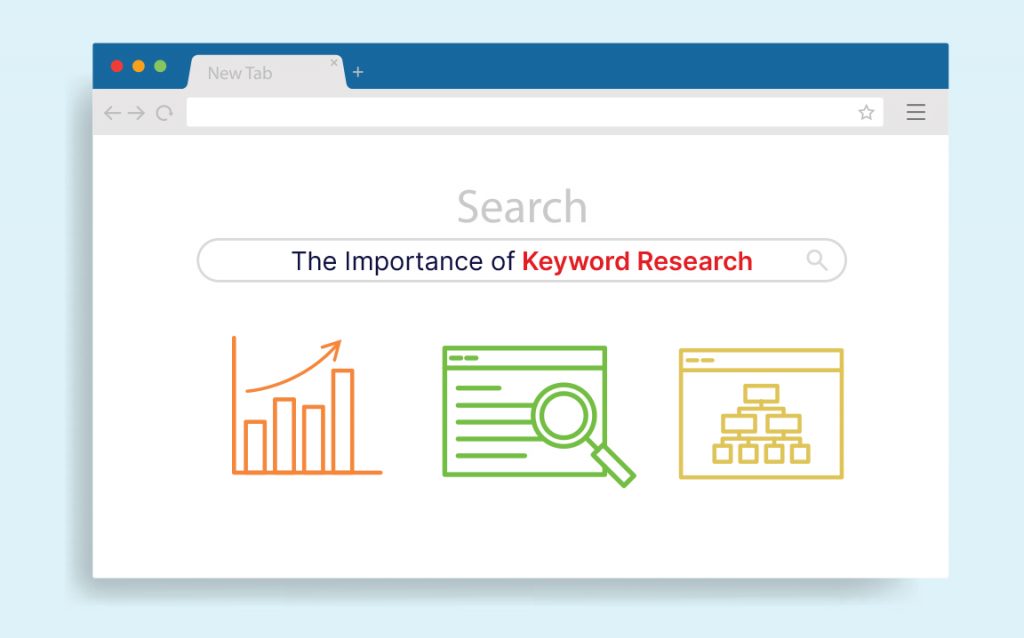
Keyword research can provide you with a lot of information about what your target audience is looking for on Google. The knowledge you gain from these genuine search phrases can inform both your content strategy and your overall marketing plan.
When conducting internet research, people use keywords to identify solutions. You stand to get more traffic if your content is successful in getting in front of your audience as they conduct searches. As a result, you should concentrate your efforts on such type of search query.
Furthermore, we should design content around what people want to discover, rather than what we want to teach them. To put it another way, our audience has come to us.

Effective keyword research may give you insights into current marketing trends and help you focus your content on themes and phrases that your target audience is looking for.

The higher you rank in search engine results for the keywords that best fit the content you post, the more traffic you’ll draw to your website.

If your company has material that other business professionals are looking for, you can fill that need and create a call to action that will guide them through the buyer journey from awareness to purchase.
You may address the questions that the majority of your audience wants answered by studying keywords for their popularity, search volume, and general intent.
Keywords, on the other hand, have evolved beyond Google’s exact-match algorithms.
We’re hearing more about how much SEO has changed in the last past years and how unimportant keywords have become to our ability to rank highly for the searches consumers conduct on a daily basis.
While this is accurate to some extent, it is a distinct approach in the eyes of an SEO specialist. Rather, it’s about the keyword’s intent and whether or not a piece of content fulfills that intent.
However, this does not imply that keyword research is no longer relevant.
Allow me to explain:
Keyword research reveals what topics people are interested in and provided you use the correct SEO tool, how popular those topics are with your target audience. Topics are the crucial word here, by analyzing keywords with a high amount of monthly searches, you can select and categorize your content into topics on which you want to write. Then, based on these subjects, you may decide which keywords to search for and target.
You are now aware of the difference of topic and keywords, now it’s time to learn about the elements of keyword research.
Upon choosing a keyword, always check its relevance. Although this is important, keyword relevancy entails more than just selecting terms that are relevant to your organization. It’s all about including all of the important terms and themes within your article. You want to let Google know that you’re not merely posting superficial stuff because you’re an expert and that’s what you do – you’re diving into the nitty-gritty with your writings.
You also need to check its Authority. Sources that Google considers authoritative will be given more weight. That means you must do everything you can to establish yourself as an authoritative source by adding helpful and informational material to your site, and promoting it to gain social signals and backlinks. Unless your material is extraordinary, you have a decreased chance of ranking if you’re not viewed as an authority in the industry, or if a keyword’s SERPs are stacked with heavy sources you can’t compete with (like Forbes or The Mayo Clinic).
And the most important is, identify its volume. You may rank on the first page for a term but if no one ever searches for it, your site will not receive any traffic. It’s a little like opening a store in the forest. MSV (monthly search volume) is a metric that measures the number of times a keyword is searched per month across all audiences.

Over half of all shoppers use Google to research their purchase before making a purchase. These search phrases or keywords are used by the search engine to discover relevant results and you won’t get many visitors if your website doesn’t rank on the first page.
So how do you pick the best keywords for the best conversions? What keywords are most effective for your company? How do you know for sure? Do you think you’ll be able to handle everything on your own?
The next topic discusses how to choose the best keywords for SEO and when you should hire an SEO agency if you can’t handle all the information provided.
You’ll learn about different types of keywords and how to find the most relevant ones and learn how to improve those phrases and include them into your landing pages.
Always remember our ultimate goal, to increase the amount of targeted traffic to your website.
Let’s talk about analyzing search intent and its types:
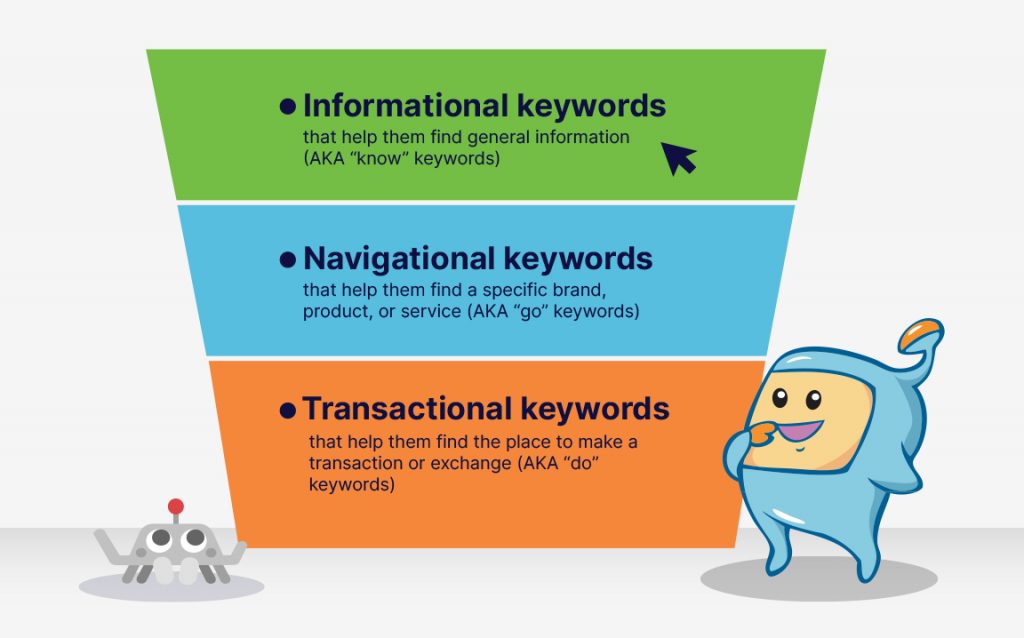
The key to selecting the ideal keyword is to think like your customer. The terms ‘buy cheap shoes‘ and ‘shoes how to repair‘ are significantly different. The first is a commercial key phrase, whereas the second is informative.
With the purpose of completing your call-to-action (CTA), you should include material on all three topics. Different landing sites or web pages dedicated to certain search phrases will be targeted by your keywords.
You should supply some unique content connected to the phrase in the case of informational searches.
Blog articles are ideal for this type of search because they can contain multiple keywords. Obviously, that content must be linked to your product pages or contact forms.
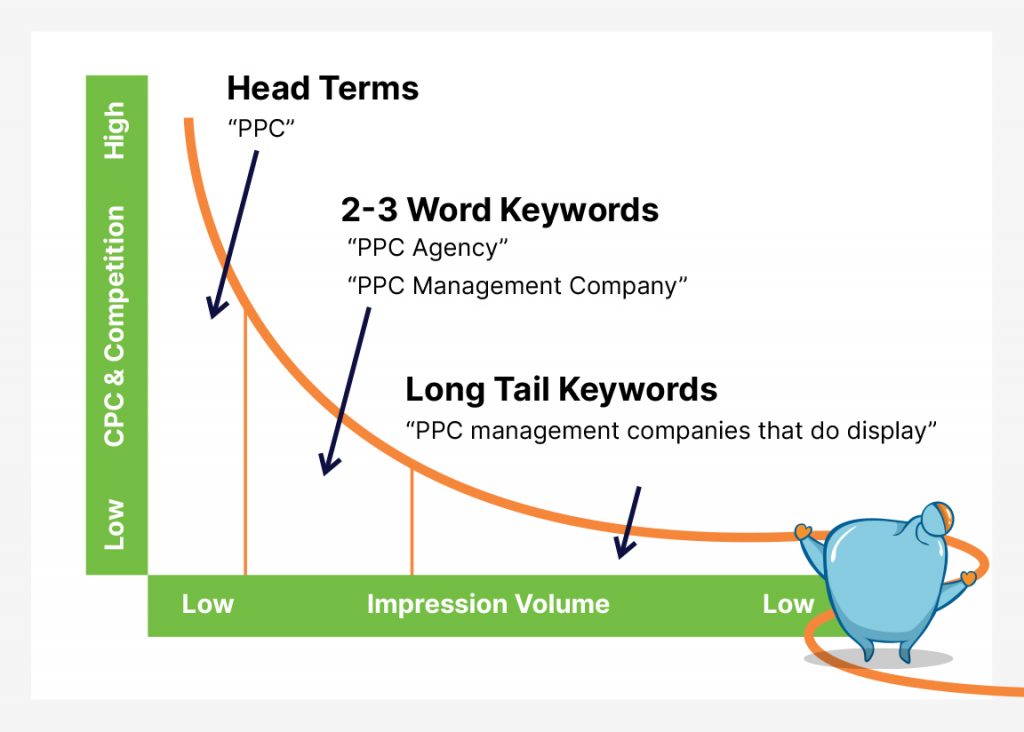
Consider these three forms of keyword research before getting started (which I mentioned above before we got here).
Finding the best keywords involves research and and certain tools to help you. Example of tools you can use is Google’s Keyword Planner. This tool that can help you find keywords for your niche.
You may use this free tool to find new keywords that are relevant to your business and view estimates of the number of searches they receive, as well as the cost of targeting them.
Check the Google Ads platform to use this tool but remember, do not make a PPC ad, just create an account then type a keyword into the planner.
The number of persons who searched for certain keywords over time is shown in the results. Related phrases with relevant traffic numbers are also displayed by the service.
You can incorporate the phrases that function well into your marketing strategy. This list can be used to bundle together related keywords for use in your SEO strategy.
Another helpful technique to get the finest keywords is to look at the websites of your competitors.
SEMRush and other similar tools can help you evaluate traffic on any website, including your competitors’. Use it to figure out where they are in the rankings. Then use what you’ve learned to help you develop your own plan. SEMRush, on the other hand, isn’t free.
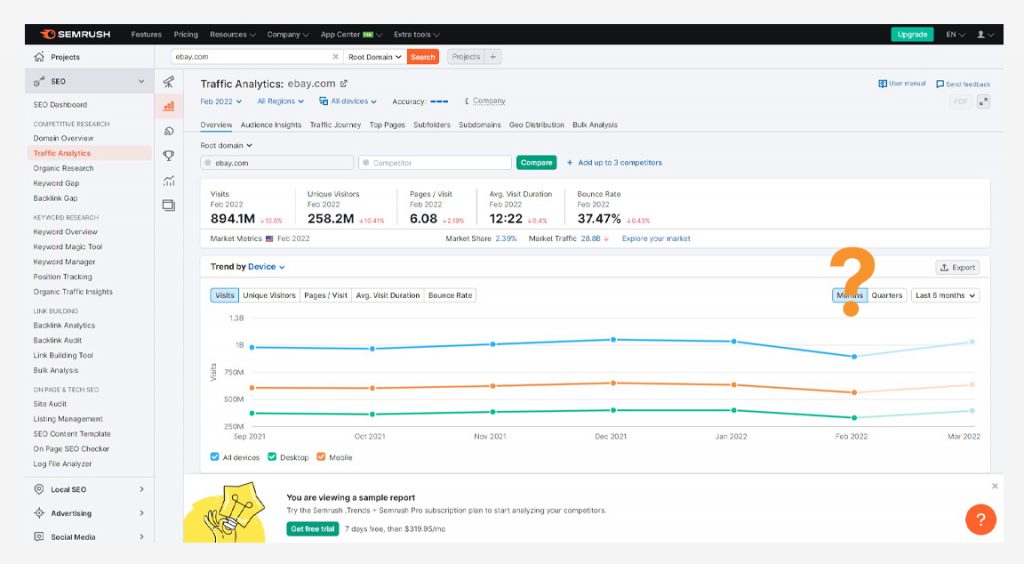
It takes a certain expertise to include keywords into your text. Many websites, on the other hand, appear to cram keywords into their text and hope for the best.
Spam-filled pages are actively targeted by Google, which either eliminates them or ranks them extremely low.
It’s critical to use the proper combination of keywords and related phrases in your text copy. Otherwise, all of your efforts will be for naught. Additionally, pairing the proper image with the right term might lead to a significant increase in rankings.
Good website text, interesting blogs, and articles are all aspects of SEO that will help your website rank and read well. This is something that must be done correctly from the beginning.
Otherwise, your landing pages will not work because they are not optimized to link with your keyword pick.
Because landing pages display targeted information, it’s critical that you link them to your keyword choices. The page title, headers, and alt image tags will all contain your chosen keywords. Everything in these should be related to the keywords you’re aiming for.
When choosing keywords, keep your landing page in mind – not only will Google rank your page higher, but a well-optimized landing page will also serve as the beginning point for a sale or lead.
Keywords are critical for attracting attention to your material. Effective keyword selection might aid in connecting your work with your intended audience. They can also help your content rank higher in search engines when weaved into an intriguing and well-written piece.
Need more help in choosing the right keywords for your site/pages? Check out our Keyword Research For Beginners to help you choose the right SEO keyword.